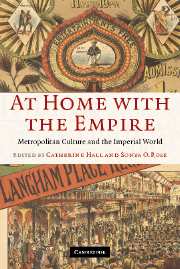Book contents
- Frontmatter
- Contents
- Notes on contributors
- 1 Introduction: being at home with the Empire
- 2 At home with history Macaulay and the History of England
- 3 A homogeneous society? Britain's internal ‘others’, 1800–present
- 4 At home with the Empire: the example of Ireland
- 5 The condition of women, women's writing and the Empire in nineteenth-century Britain
- 6 Sexuality and empire
- 7 Religion and empire at home
- 8 Metropolitan desires and colonial connections: reflections on consumption and empire
- 9 Imagining empire: history, fantasy and literature
- 10 New narratives of imperial politics in the nineteenth century
- 11 Bringing the Empire home: women activists in imperial Britain, 1790s–1930s
- 12 Taking class notes on empire
- 13 Citizenship and empire, 1867–1928
- Select bibliography
- Index
4 - At home with the Empire: the example of Ireland
Published online by Cambridge University Press: 11 April 2011
- Frontmatter
- Contents
- Notes on contributors
- 1 Introduction: being at home with the Empire
- 2 At home with history Macaulay and the History of England
- 3 A homogeneous society? Britain's internal ‘others’, 1800–present
- 4 At home with the Empire: the example of Ireland
- 5 The condition of women, women's writing and the Empire in nineteenth-century Britain
- 6 Sexuality and empire
- 7 Religion and empire at home
- 8 Metropolitan desires and colonial connections: reflections on consumption and empire
- 9 Imagining empire: history, fantasy and literature
- 10 New narratives of imperial politics in the nineteenth century
- 11 Bringing the Empire home: women activists in imperial Britain, 1790s–1930s
- 12 Taking class notes on empire
- 13 Citizenship and empire, 1867–1928
- Select bibliography
- Index
Summary
The position of Ireland within the British Empire, especially after 1801 when the United Kingdom of Great Britain and Ireland was created, divides both Irish and non-Irish historians. From this date, the political relationship between Ireland and Britain became paradoxical, with Ireland being part of the imperial parliament, yet treated by that body as a subordinate partner within the United Kingdom. Despite the new legislative framework resulting from the Union, Ireland was regarded as a colony, moreover, a dangerous one, as the intermittent rebellions attested.
The colonial association between Ireland and Britain was well established by the time of the Act of Union. It had originated in the twelfth century, although the whole country was not under English control until the early seventeenth century. Even before this time, there were attempts to control Ireland's political, economic and cultural traditions through a combination of military and legislative means and to segregate natives and settlers. From the thirteenth century, Ireland had possessed its own parliament, but after 1494 its policy-making had been subjugated to the English parliament. It was not until 1782 that the Irish parliament received limited legislative autonomy, although Catholics remained excluded. For some Irish nationalists, inspired by the revolutions in Colonial America and France, this concession was too little. An unsuccessful republican uprising in 1798 brought this phase of limited self-government to an end and precipitated the Act of Union.
- Type
- Chapter
- Information
- At Home with the EmpireMetropolitan Culture and the Imperial World, pp. 77 - 100Publisher: Cambridge University PressPrint publication year: 2006
- 5
- Cited by



